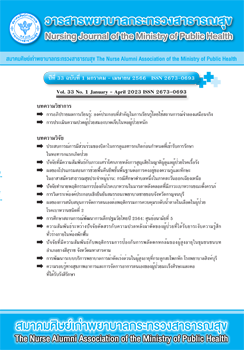Experiences of Father Participattion in Caring for their Preterm Infants in a Sick Newborn Unit
Main Article Content
Abstract
The purpose of this descriptive qualitative study was to describe fathers’ experiences of participating in the care of their preterm infants in a sick newborn unit. Participants were purposive selected, including 13 fathers of preterm infants in a sick newborn unit of a government hospital in the Eastern Region. Data were collected using in-depth interviews and observations. Thematic analysis method was used to analyze the data. The results revealed that the experiences of father participation in caring for their preterm infants in a sick newborn unit can be divided into three themes. First, the feelings about preterm infant included anxiety and fear, pity and concern, unexpectedness, and happy with the birth of their infant. Second, the activities involved in caring for their infants, including physical care, psychological care, sharing information with doctors and nurses, supporting and encouraging mothers in caring for their infants, and providing utensils. Finally, the feelings about being involved in the care of their infants included being happy, loving and preferring to do something for their infants, having learned to care for their infants, reducing the burden of mothers’ tasks, and being unconfident in the care of their infants. These findings contribute to a better understanding of fathers’ experiences in caring for their preterm infants in a sick neonatal unit. Therefore, nurses and health care providers could use the data as a basis to encourage and support fathers to participate effectively in caring for their preterm infants in a sick neonatal unit.
Article Details

This work is licensed under a Creative Commons Attribution-NonCommercial-NoDerivatives 4.0 International License.
บทความและรายงานวิจัยในวารสารพยาบาลกระทรวงสาธารณสุข เป็นความคิดเห็นของ ผู้เขียน มิใช่ของคณะผู้จัดทำ และมิใช่ความรับผิดชอบของสมาคมศิษย์เก่าพยาบาลกระทรวงสาธารณสุข ซึ่งสามารถนำไปอ้างอิงได้
References
Chawanpaiboon S, Vogel JP, Moller A-B, Lumbiganon P, Petzold M, Hogan D, et al. Global, regional, and national estimates of levels of preterm birth in 2014: a systematic review and modelling analysis. Lancet Glob Health 2019;7(1):e37-e46.
Strategy and Planning Division, Public Health Ministry. Public health statistics A.D. 2017 [Internet]. 2018 [cited 2022 July 5]. Available from: http://www.pcko.moph.go.th/Health-Statistics/stratistics60.pdf.(in Thai)
Pongsaranuntakul Y. Nursing care for preterm infants. In: Thampanichawat W, Rungamornrat S, Payakkaraung S, editors. Nursing care for high-risk neonates. Bangkok: Pre-one; 2016. p. 36-50.(in Thai)
Kolatat T. The effects of prematurity [Internet]. 2016 [cited 2022 July 5]. Available from: http:// www.tmchnetwork.com/node/164.(in Thai)
Smith VC, Stewart J. Discharge planning for high-risk newborns [Internet]. 2020 [cited 2021 January 20]. Available from: https://www.UpToDate
Ricci SS, Kyle T, Carman S. Maternity and pediatric nursing. 3rded. Philadelphia: Wolters Kluwer; 2017.
Merck T, McElfresh PB. Family-centered care of the child during illness and hospitalization. In: Hock enberry MJ, Wilson D, Rodgers CC, editors. Wong’s nursing care of infants and children. 11thed. St. Louis: Elsevier Inc;2019.658-77.
Koliouli F, Gaudron CZ, Raynaud JP. Life experiences of French premature fathers: a qualitative study. J Neonatal Nurs 2016;22(5):244-9.
Russell G, Sawyer A, Rabe H, Abbott J, Gyte G, Duley L, et al. Parents’ views on care of their very premature babies in neonatal intensive care units: a qualitative study. BMC Pediatr 2014;14:230.
Bastani F, Abadi TA, Haghani H. Effect of family-centered care on improving parental satisfaction and reducing readmission among premature infants: a randomized controlled trial. J Clin Diagn Res 2015;9(1):SC04-8.
Sukjai K. Single-parent family: the challenge to be overcome in the present Thai society. [Internet]. Office of the Royal Society;2019 [cited 2022 July 5]. Available from: http://legacy.orst.go.th/wp-content/uploads/2019/05/.(in Thai)
Sarapat P, Fongkaew W, Jintrawet U, Mesukko J, Ray L. Perceptions and practices of parents in caring for their hospitalized preterm infants. Pacific Rim Int J Nurs Res 2017; 21(3):220-33.
Braun V, Clarke V. Using thematic analysis in psychology. Qualitative research in psychology 2006;3(2):77-101.
Lincoln SY, Guba EG. Naturalistic inquiry. Newbury Park: Sage Publications;1985.
Baldoni F, Ancora G, Latour JM. Being the father of a preterm-born child: contemporary research and recommendations for NICU staff. Front Pediatr 2021;9:724992.
Sansiriphun N, Baosoung C, Klunklin A, Kantaruksa K, Liamtrirat S. Experience of first time father during labor and delivery period. Nursing Journal 2014;41Suppl:143-57.(in Thai)
Lamb ME. The history of research on father involvement. Marriage Fam Rev 2000;29(2):23-42. doi:10.1300/J002v29n02_03
Chaina S, Sansiriphun N, and Kantaruksa K. Stress, social support and father involvement during postpartum period. Nursing Journal 2015;42(4):85-96.(in Thai)
Stefana A, Padovani EM, Biban P, Lavelli M. Fathers’ experiences with their preterm babies admitted to neonatal intensive care unit: A multi-method study. J Adv Nurs 2018;74(5):1090-8.
Mörelius E, Brogren S, Andersson S, Alehagen S. Fathers’ experiences of feeding their extremely preterm infants in family-centred neonatal intensive care: a qualitative study. Int Breastfeed J 2021;16(1):46.
Pongjaturawit Y, Chontawan R, Yenbut J, Sripichyakan K, Harrigan RC. Parent participation in the care of hospitalized young children. Thai J Nurs Res 2006;10(1):18-28.

